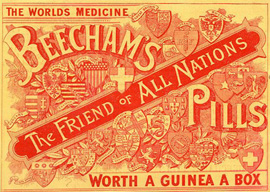
December 10, 2016

Exhortation is almost as futile as it is inevitable, at least if measured by its immediate results. I doubt that there is anyone who has neither exhorted nor been exhorted, and who has not continued sweetly down his own self-destructive path simply because it his own. La Rochefoucauld said that it is easier to give good advice than to take it, but exhortation is not mere advice, it has a cajoling or buttonholing quality. And such is the contrary nature of Man that it almost always stirs a spirit of resistance in him, however true, sensible, or obvious its exhortatory content may be.
I have made a small career of exhortation, never really expecting it to have an effect. Indeed, the idea that someone might take me so seriously that he followed my prescriptions to the letter has always frightened me slightly, for it would then make me responsible, at least in part, for the results. Besides, if everyone acted on my exhortations there would be no further need or market for them; perhaps that helps to explain why we so often also love what we say we hate. We linger lovingly on the faults and defects of others as if we wished them never to change. To decry, after all, is one of the pleasures of existence, and it comes free of charge.
Strangely enough, I quite like being exhorted, at least in print if not in person. And recently, having to go to a funeral about two hours distant, I took with me a book of exhortatory essays that I could easily slip into my pocket during the service.
There is nothing like the funeral of a friend to put one in the mood to be exhorted, for funerals make us philosophical, and Abraham Cowley’s Essays were just the thing for the journey. My edition was published in 1886, more than two centuries after the Essays were written. In the 1880s mass-market books had advertisements at the front and back, often for patent medicines. Even these advertisements should not be overlooked entirely by the curious. The one at the front of the Essays for Beecham’s Pills, which consisted of aloes, ginger, and soap, which were sold for a hundred and fifty years (till 1998), and which were a foundation of one of the largest pharmaceutical companies in the world, implied that they were abortifacient. Not only were they effective in “Bilious and Nervous Disorders, such as Wind and Pain in the Stomach, Sick Headache, Giddiness, Fulness and Swelling after Meals, Dizziness and Drowsiness, Cold Chills, Flushings of Heat, Loss of Appetite, Shortness of Breath, Costiveness, Scurvy, Blotches of the Skin, Disturbed Sleep, Frightful Dreams, and all Nervous and Trembling Sensations etc.,” all of which they would relieve in twenty minutes, but there is, for females, “no medicine to be found to equal BEECHAM’s PILLS for removing any obstruction or irregularity of the system.” This was code, of course, for the missed periods consequent upon pregnancy. A few Beecham’s Pills taken according to instructions would “soon restore females of all ages to sound and robust health,” which is to say procure them a miscarriage. Every age has its euphemisms, and 1886 was an age of gynecological correctness.
I once surveyed briefly the British provincial press of the middle of the 19th century and discovered to my surprise that about a half of proprietors or editors also sold patent medicines as a sideline, advertisements for which were overwhelmingly the major source of advertising revenue for the press of the time, and about half of which were for cures for syphilis, pre- and postmarital (never, of course, called by its name). No wonder it was an age also of exhortation.
But to return to Abraham Cowley and his Essays. Cowley (1617″1667) was an interesting man. A child prodigy, he wrote poems at the age of 10 that were considered worthy of publication judged purely on their quality. He wrote passionate love poems without ever having been in love. His was the first mention in English literature of the coca leaf, which he praised as the best of all plants. During the English Civil War he served Charles I’s wife, Queen Henrietta, in exile in France and communicated with her doomed husband in England in code. He was a founding Fellow of the Royal Society, and was awarded a medical degree by Oxford University without ever having studied medicine. Disappointed by his lack of advancement at court, he retired to the countryside with a modest income in order to study and write.
The theme of his essays”on solitude, on obscurity (lack of fame), on avarice, on the dangers confronting an honest man, on the shortness of life and uncertainty of riches”is that happiness resides in the control of one’s desires, a middling state being preferable to one of poverty or extreme wealth.
This is a very old message, of course, as Cowley himself recognizes, for he frequently quotes from the Classics, which say exactly the same thing. One cannot help wondering whether he would have said something very different if his ambitions had not been so disappointed, whether his retirement to rural simplicity was not a consolation prize rather than a goal aimed at for itself.